There was early Oscarฎ buzz about the work veteran actress Melissa
Leo has done in Frozen River ever since the feature won last
year's Sundance Film Festival Grand Jury Prize for director Courtney
Hunt (her feature film debut). Now, of course, her first nomination
for Best Actress is official.
As the star of this tale about a down-and-out unemployed mother of
two struggling to feed her kids in the very cold world of upstate
New York, the 49-year-old Leo has applied her years of experience as
a character actor and former TV star (Homicide: Life on the
Streets) and become a cinematic force by playing a character
that iconically reflects the struggle so many people are coping with
now. With this economy in the shitter, homes going into foreclosure
and few alternatives available, this film has hit a resonate note
with many who have seen it. Her character Ray Eddy gets tapped by
"friends" in the local Native American community to help transport
illegal immigrants across the Canadian border a few miles away
from her home.
Nobody ever wondered whether Leo would be a working actor she's
been active for years doing theater in NYC, television in LA to
numerous feature films throughout the world; her work in both 21
Grams and The Three Burials of Melquiades Estrada
garnered her awards-talk back when these films were released. And
she's been in more than 15 films since shooting Frozen River
(in 2008), as well as doing a three-episode stint on Law and
Order. But until she was cast in Frozen River, Leo didn't
get the right feature film lead that she deserved to get years ago.
This is such a tour de force performance. It's a breakthrough role
for you even though you've been around so long. How do you feel
about that?
I feel awed and overwhelmed by the opportunity that Courtney [Hunt,
director of Frozen River] had provided for me, first of all,
in the script that she wrote. Not only is the role the lead, but
it's something we rarely see: a woman so completely drawn, not being
somebody's somebody, but herself on her own trajectory. I think not
since Greg Nava has a director had the balls to count on me to do
that. I know the way that I work. I'm a very specific actor. I know
how to break down a script and find an arc. It was a joy and a
pleasure to do.
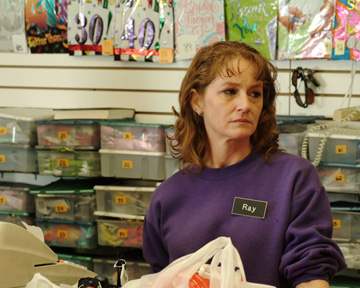 What research did you do for this role?
What research did you do for this role?
Very little research, in fact. Again, it's because of Courtney. Her
script was so complete. She had nine to ten years of research, a
gentle, getting-to-know-people kind of research, sometimes just
observing. So the script was very thorough. We had done a short
together ["Althea Faught"], and Misty Upham played the part of the
Mohawk and I played [at the time] she didn't even have a name
"the Blonde." We had done that three years before Courtney was able
to raise the money to shoot the feature. Not that we practiced or
rehearsed we never even had a table read of the whole feature
script. But when an actor has the information for a long period of
time, it sort of filters into you. Also, Courtney's faith in me was
in knowing how right I was for the role.
Did you like your character Ray Eddy? Was she somebody you could
relate to, or were there times that you wanted to slap her and say
"What are you thinking"?
When you're inside of something, you are feeling angst about that
person. It probably doesn't help playing it. Josh Brolin is a really
good pal, so it was great to talk to him about playing George Bush
just before he went to shoot W because he wasn't talking
about "the President" that he was going to play. He was talking
about a character he was going to play, and he went to play W
with love in his heart for him. You have to come there as an
audience. It was up to Courtney's script. I was perfectly aware that
Ray Eddy says some pretty scathing, racist things. That's who she
was: she was a narrow-minded woman. I think that's a good thing to
show people, so I was happy to do that. It was just a joy and a
pleasure.
She's also a consistently strong woman despite everything going on
around her. Did you find it emotionally trying?
No. Again, I wish I could tell you some stories of terror and
turmoil on it. I've been acting almost 30 years. There might have
been a day earlier when I would "lose myself" more in a character.
When I'm working, I am working I am working to make you feel, and
that's not me feeling all that do you know? I'm thinking about
where that light is, where the camera is, what was that note that
Courtney just gave me about this? So I'm working to get you all to
feel. I have a lot of fun doing it, quite frankly.
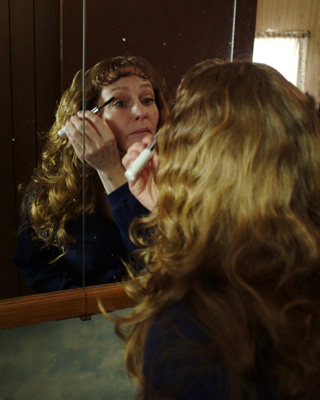 You looked pretty comfortable shooting a gun. Have you done that
before?
You looked pretty comfortable shooting a gun. Have you done that
before?
I have handled a gun or two in my time. I have never shot at
anything living. I don't know if I'd have the heart to do that. When
I was sixteen, or seventeen years old, I lived out in Oklahoma for
awhile. I shot a lot of guns back then. I was told a lot by gun
handlers, "Oh, you have to use two hands," and the kick, and "blah
blah blah." It was a .22; I know what a .22 feels like in my hand, I
know a .22 has a little bit of kick to it, but you can certainly
shoot a .22 with one hand. And I think that information helped sell
it. There was no blank in the gun, there was nothing in the gun. I
had to perform the kick of it. So I think it looks like a pretty
real shot. There was also an argument on the set. The set decorators
had to drill a hole into the door of Lila's trailer, and they came
with their little screwdriver to make that hole right in the middle
of the door. And Courtney and I were "No no no no no, wait, wait,
wait." No, she's not shooting in the middle of the door. Her
husband's most likely in there, and some other chica, in her mind.
She's not going to shoot "someone" who might be standing right by
that door. No, it's a warning shot to get attention: "LISTEN to me!"
She just bangs a hole in the bottom of the door. So they finally
went along with us and put the hole in the bottom of the door.
Was it tough working in such cold weather?
Well, there are two answers to that. First of all, I have to
recognize our crew and our shooter, Reed Morano, this itty bitty,
tiny woman. They froze their asses off, there's no question about
it. It was an arduous shoot for them. There was one night our camera
froze up. There was one night we had to move into a sound stage to
work because it was just too cold out. I, however, saw this
opportunity in front of me. I had just come from shooting something
in South Africa. I hit the ground running, I used all my ten years
living with a ski teacher and what he knows about dressing for the
weather and changing your socks in the middle of the day so your
feet don't get cold. If your feet get cold, you're done. Also there
were no trailers for us or anything like that. The holding area for
Misty and I really was that Dodge Spirit the Mighty Spirit, as I
called her and just kept comfortable in the car. We could turn it
on from time to time and get a little heat going, never wanted to
get too warm. And the weather was a part of Ray's life. It was just
another thing that actually added to the performance.
Will audiences walk away with certain message from this film
especially about single parents trying to raise children by
themselves?
The message of the film is really Courtney's job. I'm sure when she
worked with the editor, Kate Williams, they thought a lot about how
they wanted that to land. Motherhood is the uniting factor in there,
without doubt and maybe beyond motherhood, parenthood.
The responsibilities of raising children...
Exactly. That children need to be raised. You can't just have them
and set them free. It's a responsibility. So whatever that thing is
the shape of the film, the way it has all that suspense in it, and
so on as an actor, I'm not terribly aware of that as we shoot. I
leave that to the director. She was fully competent for the job,
[even] having never done it before. I actually learned things. When
I saw that first edit, "Oh, that's why we did it like that." But as
we shoot, I just go scene by scene. I'm guided by her, take notes at
the end of the day how scenes landed so when we shoot out of order,
we can hopefully help the editor sew it together in the end.
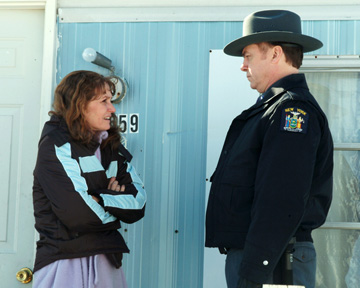 How is your character different at the end from the way she is at
the beginning?
How is your character different at the end from the way she is at
the beginning?
It's a very good question, because that's the heart of how the film,
in the end, works. It doesn't tie it up with a pretty little bow at
the end, and it doesn't leave everything sort of hanging. I didn't
really understand what happened at the end, and a lot of films fall
in that category. This has this very happy medium. A lot of times at
these screenings we come in at the very end, [the last] five or ten
minutes of the film, and the audiences are rapt; there is a sense of
satisfaction at the end of it, yeah. Ray Eddy grows and changes, and
becomes a better person. She does things she never anticipated
doing. She makes a sorta-kinda friend out of somebody she wouldn't
have given the time of day to. So by the end of the film, she hasn't
solved all of her problems but she is a better human being for
it. When my son saw the film, he pointed out that he thought it was
a little consumerist of her to want this double-wide trailer. They
had a trailer, what's the matter...? I pointed out to him that she
shifts what her needs are. She realizes that what she needs is a
roof over their heads and not one that's been burned out maybe a
little step up instead of a big step. She's become a better person
at the end.
One possible flaw to her or to the film was her way of dealing
with men. Did you work out her back story in your head?
I don't know where you get that she was so bad with men. I think she
was actually kind of stoic with them. She has a fifteen-year-old
child and a five-year-old child. The father of both of those
children is the same man. For many years Ray stood by her man, and
for many years, she went, "Well, aren't you going to look for him
this time?" She went looking for him, trying to drag him out of it,
giving him an ultimatum as many a co-dependent has done before
today.
Well, that makes her an enabler who has been enabling him for far
too long.
Of course she's enabled him, and she's taught her son to lie because
she's a liar. Courtney doesn't write good people and bad people. She
writes human beings, with all the gray in between.
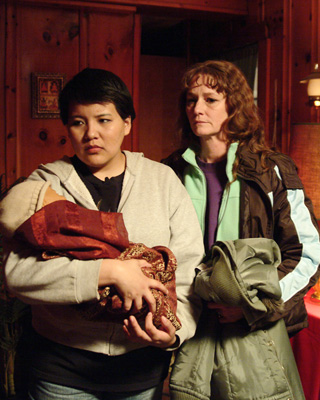 What was it like working with Native American Misty Upham who plays
Lila Little Wolf?
What was it like working with Native American Misty Upham who plays
Lila Little Wolf?
Oh, I could go on and on about working with Misty. First of all, let
me make it very clear: Misty Upham is a very different lady from
Lila Little Wolf. She is a Blackfeet Indian; they are a Northwest
[tribe]. She did take on Mohawk characteristics within the Native
American community; there are different characteristics tribally.
She's 100% Blackfeet Indian, and she's lived in a very Indian not
a rez life, but a very Indian life. She is a consummate actress. It
was a delight to work with her. We work in a very different way. She
asks a lot of questions and simply does what the director tells her.
She doesn't break down a script in the way that I do. She just comes
to it to find out what the director wants from her, and boy, does
she deliver. She would ask Courtney these little questions, and then
another little question, like "What is she on about?" and then
she'd do it and I'd get it. The other thing I delighted in about her
and really made me have respect for her is: I'm such a serious
worker. I'm very serious when I'm working, and this was a serious
thing for me. So I can get a little snarky if things go awry. Not
like "Where's my water?" but like, "No, the money was over here, it
has to be over here. It can't be over there." Specifics are very
important to me. So I'd get a little snarky with Misty from time to
time, as much as I love her too. And she would snap right back at
me, and in funny ways too wickedly funny. Very bright. Misty's
become a very close friend. She has actually stayed in my house in
Los Angeles. As an aside: the makeup artist Crystal Shade lives up
in Washington. At one point, she had not had an opportunity to see
the film. So [she to take] a 24-hour bus ride from Washington to
L.A. to get a chance to see the movie. A bus ride and then another
24-hour bus ride back home to Washington because that's what she
can afford. She's a Native American makeup artist. So I learned more
and more about what the realities are for Native Americans in this
country living today. It is a frightening reality. Courtney's film
actually only touches the tip of the iceberg about it.
Producer Heather Rae is also a Native American. What was her role in
this whole process?
I brought Heather Rae to the project. I had never met her before. I
was out at Sundance a couple of years before and Michael Greenwald,
who was my then-agent, mentioned that this woman named Heather Rae,
who had run the Native American festival at Sundance for fifteen
years. She wanted to meet me. She knew I was a client of his. I was
hanging out with [screenwriter] Kit Carson he was out there with
the re-issuing of Paris, Texas that year where he finally
got the credit due him. So Michael brought me up, and there was
Carson and Heather Rae talking to each other. I don't know if you've
ever met her, but she's one of the most beautiful human beings
you'll ever meet, both in her physical self and in her inner self. I
met her, and within three minutes of talking to her, I said, "I've
got a script you've got to read." I knew that Courtney had been
working already with [producer] Chip Hourihan, but any help we could
get, I figured. And it was a very, very nice marriage. She was an
integral part of getting the film shot. A lot of the [cast] are
experienced actors from a reservation in Canada, Gonawaga. Heather
was absolutely integral in the bringing down those people and making
the deal. There is an Indian world, and it was very helpful to have
her along on that regard, and just because she is such a decent,
beautiful person. The trio of Molly Conners, Chip Hourihan and
Heather Rae is a really good example of how the movie got made, and
how movies should be made. It's a collaborative art, and that
collaboration of our three producers was golden.
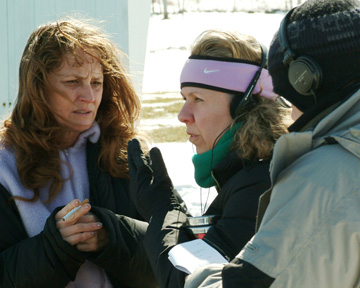 Were the Native Americans that were on the reservation that you went
to accepting of the film?
Were the Native Americans that were on the reservation that you went
to accepting of the film?
[Courtney's] short [that was the basis of this feature] was shot in
Massena on the St. Lawrence, where there is indeed reservation land
on the state side and on the Canadian side. Courtney had spent ten
years up there with those people not constantly; her husband's
from there. They'd go up and visit and she'd make her observations
and meet her people. I don't think she even gets what she did, of
making this liaison. The tribal council up there is made up of three
on that particular rez. She eventually had had two of the tribal
council agree to it and one not, and that's all the vote that she
needed for it. She wasn't obsequious about what she was doing. She
said "I'm making a movie, this is what it's about. Do you want to
read the script?" and was very open and extraordinarily respectful
as she approached them. When we went to go do the feature the
infrastructure in Massena, quite frankly, doesn't exist. There's no
hospital, there's no fire department. So Plattsburg had a better
infrastructure for us, really, and we could go out on Lake Champlain
and use that as the St. Lawrence.
When you are working on a film, not in chronological order, do you
have a notion of where you're going at all times? Or is there a
double consciousness about it?
It is probably more of a double consciousness of it. As I worked on
this particular role, I recall taking far more notes at the end of
the day than I did earlier on my own to get where that scene landed
when we actually shot it, and then to be able to go and marry the
scenes together in that way. But again, it's a lot more Courtney's
job to do it. For me to stay truthful in the moment as we're going
along, I do the best I can do, then she can make that shape when she
cuts it with her editor.
How did you meet Courtney to do that short?
I had been invited by [Focus Features founder] James Shamus, when
21 Grams was coming out, to come up to his hometown in upstate
New York for a local screening. He does a sneak preview every year
of what he likes best of Focus [Films]'s releases that year. I live
not far from there myself. There was an after-party, and Courtney
came up to me and asked if I'd read her short. If you meet her,
she's a fearsome woman in many ways, but she's also kind of shy and
awkward, too. It's not the easiest thing for her, to go up to
people. But she has a gut and an instinct like you wouldn't believe,
and she knew I was who she wanted to do this with, and where it
would go from there I don't know if she even knew in that moment
but that emboldened her and up she came. I said "Show it to me" and
one read and I said "Absolutely, I'll go do this with you."
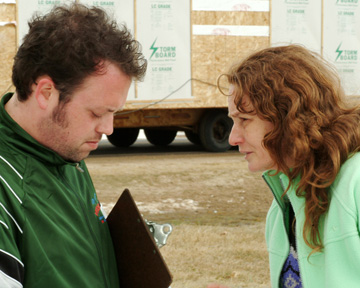 Is there a difference between working with a first-time director
like Courtney and a more established one?
Is there a difference between working with a first-time director
like Courtney and a more established one?
There is a difference. It's funny what an actor requires from a
director. But what we need most of all is that the director in fact
knows what they want their film to be, and that she knew. How do you
make a movie? We taught her as we went along all of us: Heather
Rae, Chip, me, the shooter and she learned, a learning curve like
you would not believe. She is very well suited to the job, and she
was an incredible guide. I would never deign to help direct, but to
help movie making I would give the clues where I thought necessary,
hopefully, in an appropriate way.
Is there inherently a difference between a male director's approach
and a female director's approach to their material and in working
with actors?
Well, two things. One is that it's very well established that we're
very good at multi-tasking, we women, and men are more
single-purpose. So there's that sort of difference, and I think that
that multi-tasking is ideal for film directing. But the only other
real difference besides different personalities that has nothing
to do with gender [is] the women have a harder time getting
listened to on the set. And it's always a fight: "No, I said this.
Would you please try this? How else can I ask you, I want you to put
the camera here." Men don't have to deal with that crap. So that's
the biggest difference, and generally speaking, as the shoot goes
along and they realize that the chica knows what she's doing, that
becomes a non-issue.
In your career, what are the benchmarks for you, like [working with]
a specific director or actor?
I wish I had answers to give you to that. I try very, very hard to
be in the here-and-now and be present. I love working, and don't
even mind the obstacles of working like a director that you'd
rather not be working with, and finding the best in it instead of
the worst in it. My career is a patchwork quilt of so many things,
and breakthrough after breakthrough from the first year out two
days hired on a soap opera, and the next day they wanted me to sign
a three-year contract. Eventually I was nominated for a Daytime Emmy
for it. Nothing really came of that, and on I marched. And then
Homicide: Life in the Streets came along eventually, and that
was very lucrative for five years, but a little frustrating because
I didn't get to work that much. And then I couldn't get hired. They
didn't want "Kay Howard." I was too believable in the roles, again
and again! Then came 21 Grams; "Oh wow, everything's gonna
change!" Nothing changed. Everybody thinks because Guillermo Arriaga
wrote The Three Burials of Melquiades Estrada I must have
gotten Three Burials it must have been a shoo-in talking
to him about it all along. Nahhh. Mr. [Tommy Lee] Jones had wanted
several other women before me. [Casting director] Jeanne McCarthy is
an old, old friend from back in New York when she was hoofing the
pavement with us actors, and she found out through my old manager,
Bill Tresh, that I was in L.A. and [she went] "oh my god, she
could..." Two days later, they flew me down to West Texas to meet
Mr. Jones, and I landed the job that way.
"Mister" Jones?
Ohhhhh, yeah.
It was like that from everyone?
No, that's my respect I pay him, absolutely. I don't know the man
well enough to call him Tom, or Tommy.
At one point, I started laughing even though it was a serious scene,
because she's so cynical and hard-assed in a way. That performance
worked because of how lived-in it felt, and you managed to add in a
lot of tones to the character.
Oh good, we love it when you laugh, yes.
How do you feel about this Oscar buzz?
It feels quite delightful. Am I thinking I'm going to get an Oscar?
No, I'm thinking that's good publicity. That might help me get work.
That's what I'm thinking. So spread the word.